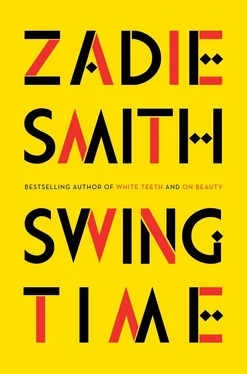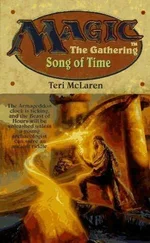Zadie Smith - Swing Time
Здесь есть возможность читать онлайн «Zadie Smith - Swing Time» весь текст электронной книги совершенно бесплатно (целиком полную версию без сокращений). В некоторых случаях можно слушать аудио, скачать через торрент в формате fb2 и присутствует краткое содержание. Город: NYC, Год выпуска: 2016, ISBN: 2016, Издательство: Penguin Publishing Group, Жанр: Современная проза, на английском языке. Описание произведения, (предисловие) а так же отзывы посетителей доступны на портале библиотеки ЛибКат.
- Название:Swing Time
- Автор:
- Издательство:Penguin Publishing Group
- Жанр:
- Год:2016
- Город:NYC
- ISBN:978-0-39956-431-4
- Рейтинг книги:4 / 5. Голосов: 1
-
Избранное:Добавить в избранное
- Отзывы:
-
Ваша оценка:
- 80
- 1
- 2
- 3
- 4
- 5
Swing Time: краткое содержание, описание и аннотация
Предлагаем к чтению аннотацию, описание, краткое содержание или предисловие (зависит от того, что написал сам автор книги «Swing Time»). Если вы не нашли необходимую информацию о книге — напишите в комментариях, мы постараемся отыскать её.
Dazzlingly energetic and deeply human,
is a story about friendship and music and stubborn roots, about how we are shaped by these things and how we can survive them. Moving from northwest London to West Africa, it is an exuberant dance to the music of time.
Swing Time — читать онлайн бесплатно полную книгу (весь текст) целиком
Ниже представлен текст книги, разбитый по страницам. Система сохранения места последней прочитанной страницы, позволяет с удобством читать онлайн бесплатно книгу «Swing Time», без необходимости каждый раз заново искать на чём Вы остановились. Поставьте закладку, и сможете в любой момент перейти на страницу, на которой закончили чтение.
Интервал:
Закладка:
In July, Miss Isabel called my mother to ask if Tracey and I would be volunteers at her end-of-summer show. I was flattered: when we were kids ex-students had seemed like gods to us, long-legged and independent, giggling with each other and speaking their whispered adolescent currency as they took our tickets, ran the tombola, served snacks, handed out prizes. But that painful morning in King’s Cross was still fresh in my mind. I knew that Miss Isabel’s vision of our friendship was stuck in time, but I couldn’t stand to break her image of it. I said yes via my mother and waited to hear about Tracey. The next day Miss Isabel called again: Tracey had agreed. But neither of us phoned the other or made any attempt at contact. I didn’t see her till the morning of the concert itself, when I decided I’d be the bigger person and go over to her place. I pressed the doorbell twice. After a strangely long pause Louie answered. I was surprised: we seemed to have surprised each other. He wiped some sweat from above his mustache and asked me gruffly what I wanted. Before I could answer I heard Tracey, in a funny sort of voice — I almost didn’t recognize it — shouting at her father to let me in, and Louie nodded and let me pass, but walked the other way, straight out of the door and along the corridor. I watched him hurry down the stairs, across the lawn and away. I turned back into the flat, but Tracey was not in the hall, and then not in the living room and then not in the kitchen: I had the feeling she was leaving each room a moment before I reached it. I found her in the bathroom. I would have said she had been recently crying, but I can’t be sure. I said hello. At the same moment she looked quickly down at herself, at the same spot I was looking at, straightening her crop top until it once again fully covered her bra.
We walked back out and down the stairs. I couldn’t speak but Tracey was never tongue-tied, not even in extreme situations, and chatted now in a bright, comical style, about all the “skinny bitches” she was up against in her auditions, the new moves she had to learn, the problem of projecting your voice beyond the footlights. She spoke quickly and constantly, to ensure no gap or pause in which I might ask a question, and in this way she got us both safely out of the estate and to the church door, where we met Miss Isabel. We were given matching keys, shown how to lock the cashbox and where to store it, how to close and open up the church before and after, and other small, practical things. As we walked around the space Miss Isabel asked a lot of questions about Tracey’s new life, about the small roles she was already getting within her school and the big roles outside of it she hoped one day to get. There was something beautiful and innocent in these questions. I could see Tracey wanted to be the girl Miss Isabel had in her mind, the kind whose life is uncluttered and straightforward, who has nothing but goals in front of her, bright and clear and nothing standing in her way. Taking on the role of this girl, she walked through this familiar space of our girlhood, reminiscing, remembering to shorten her vowels, her hands behind her back, like a tourist wandering through a museum, looking over the exhibits of a painful history, the kind of tourist who has no personal attachment to what she sees. When we came to the back of a church, where the children were queuing up for their juice and biscuits, they all looked up at Tracey with a wild admiration. She had her hair in a dancer’s bun and a Pineapple Studios bag slung over her shoulder, she turned her feet out as she walked, she was the dream we’d both had, a decade before, when we’d queued up for juice here, little girls ourselves. No one paid much attention to me — even the children could see I wasn’t a dancer any longer — and Tracey seemed happy to be surrounded by all these little admirers. To them she was beautiful and grown-up, enviably talented, free. And by looking at her this way, too, it was easy to tell myself I’d been imagining things.
I made my way across the room, and back in time, until I got to Mr. Booth. He was still sitting on his battered piano seat, a little older, but to me unchanged, and playing an unseasonable tune: “Have Yourself a Merry Little Christmas. ” And here that seamless thing happened, which, in its very unreality, makes people hate musicals, or so people tell me when I say I like them: we began making music together, without discussion or rehearsal. He knew the music, I knew the words. I sang about faithful friends. Tracey turned my way, and smiled, a melancholy but affectionate smile, or maybe it only carried the memory of affection. I saw the seven-, eight-, nine- and ten-year-old in her, the teenager, the little woman. All of these versions of Tracey were reaching across the years of the church hall to ask me a question: What are you going to do? To which we both already knew the answer. Nothing.
It looked less like the opening of a school than the announcement of the end of an old regime. A troop of young soldiers dressed in dark blue uniforms stood in the middle, holding their brass instruments, brutally sweating. There was no shade out there and they’d been in position for an hour already. I was sitting a hundred yards from them, under the canopy, with the great and good of the whole upper-river region, some local and international press, Granger and Judy, but not the President, and not Aimee, not yet. Fern was to bring her over, when everything was set and all were in place: a long process. Lamin and Hawa, who were neither great nor good, had been relegated to some far-off spot, distant from us, for the hierarchy of the seating was absolute. Every fifteen minutes or so Judy, or sometimes Granger, or sometimes me, would suggest that someone should really get those poor musical soldiers some water, but none of us did, and no one else did either. Meanwhile the nursery schools trooped in, each school in its distinctive uniform, pinafores, shirts and shorts in striking combinations of colors — orange and gray, or purple and yellow — led by small groups of women, their teachers, who had pulled out all the stops in terms of glamour. The teachers of Kunkujang Keitaya Nursery School wore tight red T-shirts and black jeans with rhinestone pockets and their hair in elaborate braids. The teachers of Tujereng Nursery School wore wrappers and headscarves of matching red-and-orange design and identical white platform sandals. Each team took a different approach from the next but like the Supremes maintained a perfect uniformity within their group. They entered through the main gate, sashayed across the yard, trailing children, poker-faced — as if they didn’t hear us all cheering — and when they reached their assigned spot two of the women would then unsmilingly unfurl a homemade banner with the name of the school upon it and stand holding it, shifting their weight from hip to hip as the wait continued. I don’t think I ever saw so many outrageously beautiful women in one place. I’d been dressed up too — Hawa told me firmly that my usual khakis and crumpled linen would not do — borrowing a white-and-yellow wrapper and top from my host, which, being far too narrow for me, I could not close at the back and so had to disguise the open seam with a wide red scarf casually thrown over my shoulders, although it was at least 102 degrees.
Finally, almost two hours after we’d sat down, all who were to be in the yard were in the yard, and Aimee, surrounded by a jostling crowd of well-wishers, was led by Fern to her central seat. Camera bulbs flared. And the first thing she turned to ask me was: “Where’s Lamin?” I didn’t have a chance to tell her: horns blew, the main event was upon us, and sitting back in my chair, I wondered if I might in fact have misunderstood everything I’d been so sure I’d understood in the previous two weeks. For now a parade of children walked into the square in costume, all of about seven or eight years old, dressed as the leaders of African nations. They came in kente-cloth and dashikis and Nehru collars and safari suits, and each had their own entourage, made up of other children who’d been done up as security guards: dark suits and dark glasses, speaking into fake walkie-talkies. Many of the little leaders had little wives by their side, dangling little handbags, though Lady Liberia walked alone, and South Africa came with three wives, who linked arms with each other as they walked behind him. To look at the crowd you would think nothing funnier had been seen by anyone in their lives, and Aimee, who also found it hilarious, wiped tears from her eyes as she reached out to hug the President of Senegal or squeeze the cheek of the President of Côte d’Ivoire. The leaders paraded past the desperate, sweating soldiers, and then in front of our seats, where they waved and posed for pictures but would not smile or speak. Then the band stopped blaring welcome horns and began a very loud brass rendition of the national anthem. Our chairs vibrated. I turned and saw two massive vehicles rumbling into the yard over the sandy ground: the first an SUV like the one in which we’d traveled four months before, and the second a real police jeep, so heavily armored it looked like a tank. Maybe a hundred children and teenagers from the village ran alongside these vehicles, behind, sometimes in front, but always dangerously close to the wheels, cheering and whooping. In the first car, standing up through the sun-roof, was an eight-year-old version of the President himself, in his white grand boubou and white kufi cap, holding his cane. A real stab at verisimilitude had been attempted: he was as dark as the President and had the same frog face. Next to him stood an eight-year-old glamour-girl, of about my shade, in a wig and a slinky red dress, throwing handfuls of Monopoly money into the crowd. Clinging to the sides of the car were more of these little security guards, with little sunglasses and little guns, which they pointed at the children, some of whom opened their arms in delight to expose their little chests to the aim of their peers. Two adult versions of these security types, in the same outfit, but with no gun, or not as far as I could see, ran beside the car, filming all this on the latest video cameras. In the police jeep bringing up the rear the little policemen with their toy guns shared space with real policemen with real Kalashnikovs. Both the little and big policemen held their guns in the air, to the delight of the children, who ran behind and tried to clamber into the back of the jeep themselves, to get to where the power was. The adults I sat among seemed torn between smiling cheers — whenever the cameras swung round to catch them — and crying out in terror as the vehicles threatened every moment to collide with their running children. “Move on over,” I heard a real policeman shout, to a persistent boy at his right axel, who was pleading for sweets. “Or we’ll move on over you!”
Читать дальшеИнтервал:
Закладка:
Похожие книги на «Swing Time»
Представляем Вашему вниманию похожие книги на «Swing Time» списком для выбора. Мы отобрали схожую по названию и смыслу литературу в надежде предоставить читателям больше вариантов отыскать новые, интересные, ещё непрочитанные произведения.
Обсуждение, отзывы о книге «Swing Time» и просто собственные мнения читателей. Оставьте ваши комментарии, напишите, что Вы думаете о произведении, его смысле или главных героях. Укажите что конкретно понравилось, а что нет, и почему Вы так считаете.












